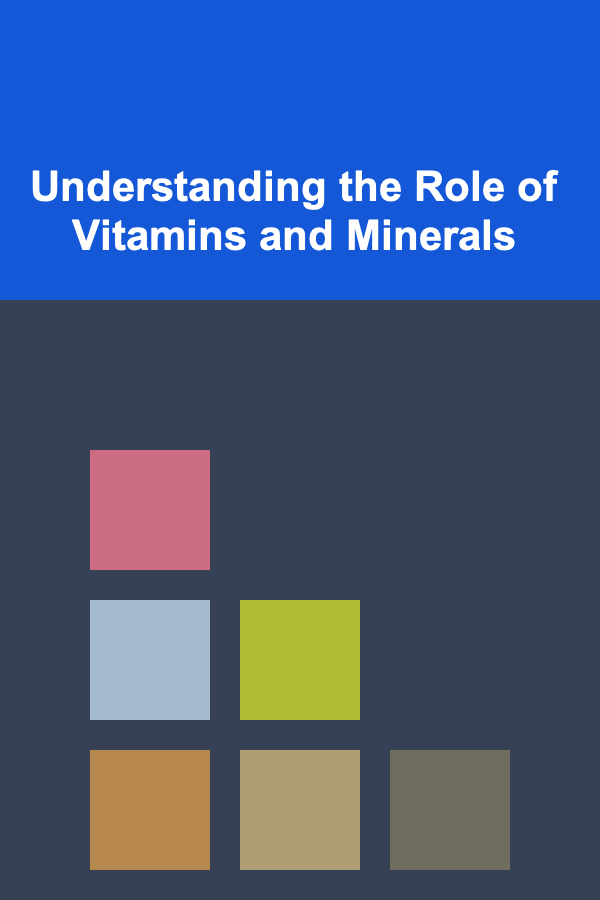
Understanding the Role of Vitamins and Minerals
ebook include PDF & Audio bundle (Micro Guide)
$12.99$11.99
Limited Time Offer! Order within the next:

Vitamins and minerals are essential micronutrients that play crucial roles in maintaining overall health and well-being. Unlike macronutrients (carbohydrates, fats, and proteins), micronutrients are required in smaller amounts, but their impact on physiological functions is profound. A deficiency in even a single vitamin or mineral can lead to a range of health problems, from mild fatigue to severe and life-threatening conditions. This article provides an in-depth exploration of the roles vitamins and minerals play in the human body, delving into their specific functions, dietary sources, absorption mechanisms, deficiency symptoms, and the potential risks associated with excessive intake.
The Fundamental Difference: Organic vs. Inorganic
A key distinction between vitamins and minerals lies in their chemical composition. Vitamins are organic compounds, meaning they contain carbon. They are derived from plants and animals and are susceptible to degradation by heat, light, and chemical processes. Minerals, on the other hand, are inorganic substances, meaning they do not contain carbon. They are elements found in the earth's crust and are more stable than vitamins, being resistant to degradation by heat and other environmental factors.
Vitamins: Orchestrating Biochemical Reactions
Vitamins are broadly classified into two groups: fat-soluble and water-soluble. This classification is critical because it influences how these vitamins are absorbed, stored, and excreted from the body.
Fat-Soluble Vitamins (A, D, E, K)
Fat-soluble vitamins are absorbed along with dietary fats in the small intestine. They are then transported via the lymphatic system and stored in the liver and adipose tissue. This storage capacity means that deficiencies of fat-soluble vitamins are less likely to develop quickly, but it also carries the risk of toxicity if consumed in excessive amounts.
- Vitamin A (Retinol, Retinal, Retinoic Acid): Vitamin A is crucial for vision, particularly night vision. It plays a vital role in cell growth and differentiation, immune function, and reproductive health. It's a key component of rhodopsin, a light-sensitive pigment in the retina. Different forms of vitamin A have different functions; retinol is important for reproduction, retinal for vision, and retinoic acid for cell growth and differentiation. Food sources include liver, dairy products, orange and yellow fruits and vegetables (carrots, sweet potatoes, mangoes), and dark green leafy vegetables. Deficiency can lead to night blindness, dry eyes, increased susceptibility to infections, and impaired growth. Excessive intake can cause liver damage, bone pain, and birth defects.
- Vitamin D (Calciferol): Vitamin D is essential for calcium absorption and bone health. It helps regulate calcium and phosphate levels in the blood, which are critical for bone mineralization, muscle function, and nerve transmission. The body can synthesize vitamin D when the skin is exposed to sunlight, but dietary sources are also important, especially in individuals with limited sun exposure. Food sources include fortified milk, fatty fish (salmon, tuna, mackerel), and egg yolks. Deficiency can lead to rickets in children (softening of bones) and osteomalacia in adults (bone pain and muscle weakness). Excessive intake can cause hypercalcemia (high blood calcium levels), which can lead to kidney stones, nausea, and weakness.
- Vitamin E (Tocopherol): Vitamin E is a powerful antioxidant that protects cells from damage caused by free radicals. It also plays a role in immune function, blood vessel dilation, and blood clotting. It neutralizes free radicals, preventing oxidative damage to cell membranes, proteins, and DNA. Food sources include vegetable oils (wheat germ oil, sunflower oil, safflower oil), nuts, seeds, and green leafy vegetables. Deficiency is rare but can cause nerve damage, muscle weakness, and impaired immune function. Excessive intake can interfere with blood clotting and increase the risk of bleeding, especially in individuals taking anticoagulant medications.
- Vitamin K (Phylloquinone, Menaquinone): Vitamin K is essential for blood clotting. It helps activate several proteins that are involved in the coagulation cascade. It also plays a role in bone metabolism. Phylloquinone (K1) is found in green leafy vegetables, while menaquinone (K2) is produced by bacteria in the gut. Food sources include green leafy vegetables (spinach, kale, broccoli), vegetable oils, and some fruits. Deficiency can lead to impaired blood clotting and increased risk of bleeding. Newborns are often given vitamin K injections at birth to prevent bleeding disorders. Excessive intake is rare and generally not associated with toxicity, but it can interfere with anticoagulant medications.
Water-Soluble Vitamins (B Vitamins and Vitamin C)
Water-soluble vitamins are not stored in the body to a significant extent and are excreted in the urine. This means that a consistent daily intake is necessary to maintain adequate levels. Deficiencies can develop more quickly compared to fat-soluble vitamins, but the risk of toxicity is generally lower because excess amounts are readily excreted.
- Vitamin C (Ascorbic Acid): Vitamin C is a potent antioxidant that supports immune function, collagen synthesis, and iron absorption. It's crucial for wound healing and the maintenance of healthy skin, blood vessels, and cartilage. It neutralizes free radicals and protects against oxidative stress. Food sources include citrus fruits (oranges, lemons, grapefruits), berries, bell peppers, and broccoli. Deficiency can lead to scurvy, characterized by fatigue, weakness, bleeding gums, and impaired wound healing. Excessive intake can cause gastrointestinal distress, such as diarrhea and stomach cramps.
- B Vitamins: The B vitamins are a group of eight essential nutrients that play crucial roles in energy metabolism, nerve function, and cell growth. They act as coenzymes, helping enzymes carry out their functions in various metabolic pathways.
- Thiamin (B1): Essential for carbohydrate metabolism and nerve function. Food sources include pork, whole grains, and legumes. Deficiency can lead to beriberi, characterized by nerve damage, muscle weakness, and heart problems.
- Riboflavin (B2): Essential for energy metabolism and cell growth. Food sources include dairy products, eggs, and green leafy vegetables. Deficiency can lead to cheilosis (cracking at the corners of the mouth), glossitis (inflammation of the tongue), and dermatitis.
- Niacin (B3): Essential for energy metabolism, DNA repair, and nerve function. The body can also synthesize niacin from the amino acid tryptophan. Food sources include meat, poultry, fish, and whole grains. Deficiency can lead to pellagra, characterized by the "four D's": dermatitis, diarrhea, dementia, and death. High doses of niacin are sometimes used to lower cholesterol levels, but they can cause flushing and other side effects.
- Pantothenic Acid (B5): Essential for energy metabolism and hormone production. It's found in a wide variety of foods, so deficiency is rare.
- Pyridoxine (B6): Essential for amino acid metabolism, nerve function, and red blood cell formation. Food sources include meat, poultry, fish, bananas, and potatoes. Deficiency can lead to nerve damage, anemia, and skin problems.
- Biotin (B7): Essential for carbohydrate, fat, and protein metabolism. It's also important for healthy hair and nails. Food sources include eggs, nuts, and seeds. Deficiency is rare but can cause hair loss, skin rashes, and neurological problems.
- Folate (B9): Essential for cell growth, DNA synthesis, and red blood cell formation. It's particularly important during pregnancy to prevent neural tube defects in the developing fetus. Food sources include green leafy vegetables, legumes, and fortified grains. Deficiency can lead to anemia and neural tube defects.
- Cobalamin (B12): Essential for nerve function, DNA synthesis, and red blood cell formation. It requires a substance called intrinsic factor, produced in the stomach, for absorption. Food sources include meat, poultry, fish, eggs, and dairy products. Vegans are at risk of B12 deficiency and should take supplements or consume fortified foods. Deficiency can lead to anemia, nerve damage, and cognitive impairment.
Minerals: Building Blocks and Regulators
Minerals are inorganic substances that are essential for various bodily functions, including bone health, nerve function, muscle contraction, and fluid balance. They are classified as macrominerals and trace minerals, based on the amounts required by the body.
Macrominerals: Needed in Larger Quantities
Macrominerals are required in amounts greater than 100 milligrams per day.
- Calcium (Ca): Calcium is the most abundant mineral in the body, with the majority stored in bones and teeth. It's essential for bone health, muscle contraction, nerve transmission, and blood clotting. Food sources include dairy products, green leafy vegetables, and fortified foods. Deficiency can lead to osteoporosis (weak and brittle bones) and muscle cramps. Excessive intake can cause constipation, kidney stones, and impaired absorption of other minerals.
- Phosphorus (P): Phosphorus is essential for bone health, energy metabolism, and cell membrane structure. It works with calcium to build and maintain strong bones and teeth. Food sources include meat, poultry, fish, dairy products, and nuts. Deficiency is rare but can occur in individuals with certain medical conditions. Excessive intake can interfere with calcium absorption.
- Magnesium (Mg): Magnesium is involved in over 300 enzyme reactions in the body. It's essential for muscle and nerve function, blood sugar control, and blood pressure regulation. Food sources include green leafy vegetables, nuts, seeds, and whole grains. Deficiency can lead to muscle cramps, fatigue, and irregular heartbeat. Excessive intake can cause diarrhea.
- Sodium (Na): Sodium is essential for fluid balance, nerve transmission, and muscle contraction. It's primarily found in extracellular fluid. Food sources include processed foods, table salt, and naturally occurring in some foods. Excessive intake can lead to high blood pressure (hypertension) and increased risk of heart disease and stroke.
- Potassium (K): Potassium is essential for fluid balance, nerve transmission, and muscle contraction. It works with sodium to regulate fluid balance. Food sources include fruits, vegetables, and dairy products. Deficiency can lead to muscle weakness, fatigue, and irregular heartbeat. Excessive intake can cause heart problems.
- Chloride (Cl): Chloride is essential for fluid balance and stomach acid production. It's primarily found in extracellular fluid and is often consumed with sodium as table salt. Deficiency is rare. Excessive intake can contribute to high blood pressure.
- Sulfur (S): Sulfur is a component of some amino acids and vitamins. It's important for protein structure and enzyme function. It's found in protein-rich foods. Deficiency is rare.
Trace Minerals: Needed in Smaller Quantities
Trace minerals are required in amounts less than 100 milligrams per day.
- Iron (Fe): Iron is essential for oxygen transport in the blood. It's a component of hemoglobin, the protein in red blood cells that carries oxygen from the lungs to the tissues. Food sources include meat, poultry, fish, beans, and fortified cereals. Deficiency can lead to anemia, characterized by fatigue, weakness, and shortness of breath. Excessive intake can cause iron overload (hemochromatosis), which can damage the liver, heart, and other organs.
- Zinc (Zn): Zinc is essential for immune function, wound healing, and cell growth. It's involved in numerous enzyme reactions and is important for taste and smell. Food sources include meat, poultry, shellfish, nuts, and seeds. Deficiency can lead to impaired immune function, delayed wound healing, and loss of taste and smell. Excessive intake can interfere with copper absorption and impair immune function.
- Iodine (I): Iodine is essential for thyroid hormone production. Thyroid hormones regulate metabolism, growth, and development. Food sources include iodized salt, seafood, and dairy products. Deficiency can lead to hypothyroidism (underactive thyroid), goiter (enlarged thyroid gland), and developmental problems in infants. Excessive intake can also cause thyroid problems.
- Selenium (Se): Selenium is an antioxidant that protects cells from damage. It also plays a role in thyroid hormone metabolism and immune function. Food sources include seafood, meat, poultry, and nuts. Deficiency is rare but can lead to heart problems and impaired immune function. Excessive intake can cause selenium toxicity, characterized by hair loss, nail changes, and neurological problems.
- Copper (Cu): Copper is essential for iron metabolism, nerve function, and antioxidant defense. It's involved in the formation of red blood cells and the maintenance of healthy connective tissue. Food sources include shellfish, nuts, seeds, and whole grains. Deficiency is rare but can lead to anemia and neurological problems. Excessive intake can cause liver damage.
- Manganese (Mn): Manganese is essential for bone formation, energy metabolism, and antioxidant defense. It's involved in numerous enzyme reactions. Food sources include whole grains, nuts, seeds, and tea. Deficiency is rare. Excessive intake can cause neurological problems.
- Fluoride (F): Fluoride is essential for bone and teeth health. It helps prevent tooth decay and strengthens bones. It's often added to drinking water and toothpaste. Excessive intake can cause fluorosis, characterized by discoloration of the teeth.
- Chromium (Cr): Chromium is involved in glucose metabolism. It may help improve insulin sensitivity and blood sugar control. Food sources include whole grains, meat, and vegetables. Research on the benefits of chromium supplementation is ongoing.
- Molybdenum (Mo): Molybdenum is essential for enzyme function. It's involved in the metabolism of sulfur-containing amino acids and other compounds. Deficiency is rare.
Bioavailability and Absorption
The bioavailability of vitamins and minerals refers to the extent to which they are absorbed and utilized by the body. Several factors can influence bioavailability, including:
- Dietary Factors: The presence of other nutrients in the diet can either enhance or inhibit the absorption of certain vitamins and minerals. For example, vitamin C enhances iron absorption, while phytates in grains and legumes can inhibit the absorption of zinc and iron.
- Form of the Nutrient: The chemical form of a vitamin or mineral can affect its absorption. For example, heme iron (found in animal products) is more readily absorbed than non-heme iron (found in plant-based foods).
- Gastrointestinal Health: Conditions that affect the digestive system, such as Crohn's disease or celiac disease, can impair the absorption of vitamins and minerals.
- Age: Absorption of some nutrients, such as vitamin B12, may decrease with age.
- Medications: Some medications can interfere with the absorption or metabolism of vitamins and minerals.
Supplementation: When and Why?
While obtaining vitamins and minerals from a balanced diet is ideal, supplementation may be necessary in certain circumstances.
- Deficiencies: Supplementation is essential to correct diagnosed deficiencies of specific vitamins or minerals.
- Pregnancy: Pregnant women require increased amounts of certain nutrients, such as folate and iron, to support the growth and development of the fetus.
- Certain Medical Conditions: Individuals with certain medical conditions, such as malabsorption syndromes or kidney disease, may require supplementation to maintain adequate nutrient levels.
- Dietary Restrictions: Individuals following restrictive diets, such as vegans, may need to supplement with nutrients that are primarily found in animal products, such as vitamin B12.
- Age: Older adults may benefit from supplementation with vitamin D and vitamin B12.
However, it's important to note that supplementation is not a substitute for a healthy diet. Excessive intake of some vitamins and minerals can be harmful. It's always best to consult with a healthcare professional or registered dietitian before starting any new supplement regimen to determine the appropriate dosage and ensure that it's safe and effective for your individual needs.
Potential Risks of Excessive Intake
While vitamins and minerals are essential, consuming them in excessive amounts can lead to adverse health effects. Megadoses of certain vitamins and minerals can cause toxicity, interfere with the absorption of other nutrients, or interact with medications.
- Vitamin A Toxicity: Can cause liver damage, bone pain, and birth defects.
- Vitamin D Toxicity: Can cause hypercalcemia, kidney stones, and nausea.
- Vitamin E Toxicity: Can interfere with blood clotting and increase the risk of bleeding.
- Niacin Toxicity: Can cause flushing, liver damage, and elevated blood sugar levels.
- Vitamin B6 Toxicity: Can cause nerve damage.
- Iron Overload (Hemochromatosis): Can damage the liver, heart, and other organs.
- Zinc Toxicity: Can interfere with copper absorption and impair immune function.
- Selenium Toxicity: Can cause hair loss, nail changes, and neurological problems.
It's crucial to adhere to the recommended dietary allowances (RDAs) or adequate intakes (AIs) for vitamins and minerals and to avoid exceeding the tolerable upper intake levels (ULs). These values are established by scientific organizations and represent the amounts of nutrients that are considered safe and adequate for most individuals.
Conclusion
Vitamins and minerals are vital for maintaining optimal health and well-being. They participate in a vast array of biochemical reactions, support essential physiological functions, and protect against chronic diseases. Understanding the specific roles of different vitamins and minerals, their dietary sources, factors affecting their bioavailability, and the potential risks of excessive intake is crucial for making informed choices about diet and supplementation. A balanced diet rich in fruits, vegetables, whole grains, lean proteins, and healthy fats is the foundation for obtaining adequate amounts of these essential micronutrients. When supplementation is necessary, it should be done under the guidance of a healthcare professional to ensure safety and effectiveness. By prioritizing a nutrient-rich diet and understanding the intricacies of vitamin and mineral metabolism, individuals can take proactive steps to support their long-term health and vitality.

Becoming a UX/UI Designer: Key Strategies for Crafting User-Centered Designs
Read More
How to Create a Profitable Travel Lifestyle: Make Money While You Explore
Read More
How to Use Pegboards for Tool and Supply Organization
Read More
Getting Started with Neuroprosthetics: A Comprehensive Guide
Read More
Exploring the Benefits of Bowen Therapy
Read More
How to Cook with Plant-Based Proteins
Read MoreOther Products

Becoming a UX/UI Designer: Key Strategies for Crafting User-Centered Designs
Read More
How to Create a Profitable Travel Lifestyle: Make Money While You Explore
Read More
How to Use Pegboards for Tool and Supply Organization
Read More
Getting Started with Neuroprosthetics: A Comprehensive Guide
Read More
Exploring the Benefits of Bowen Therapy
Read More